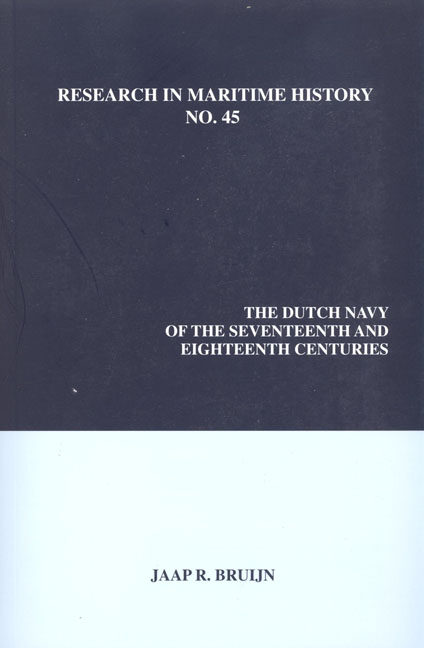Book contents
- Frontmatter
- Contents
- Illustrations
- Tables
- Series Editor's Foreword
- About the Author
- Introduction to the 2011 Edition
- Foreword
- Preface
- Introduction
- Map of the Dutch Republic
- Map of Dutch Naval Activity in European Waters
- Part One The “Old” Navy, Late 1500s-1652
- Part Two The “New” Navy, 1652-1713
- Part Three A Second-Rate Navy, 1714-1795
- In Retrospect
- Bibliography
- Index
Part Three - A Second-Rate Navy, 1714-1795
- Frontmatter
- Contents
- Illustrations
- Tables
- Series Editor's Foreword
- About the Author
- Introduction to the 2011 Edition
- Foreword
- Preface
- Introduction
- Map of the Dutch Republic
- Map of Dutch Naval Activity in European Waters
- Part One The “Old” Navy, Late 1500s-1652
- Part Two The “New” Navy, 1652-1713
- Part Three A Second-Rate Navy, 1714-1795
- In Retrospect
- Bibliography
- Index
Summary
The War of the Spanish Succession is generally considered a turning point in the history of the United Provinces as a major power in Europe. The Dutch were forced to fight an expensive war on several fronts, both on shore and at sea. Public finances had already been exhausted several years before the Peace of Utrecht was concluded in 1713. In July 1709, for instance, the admiralty at Amsterdam had pleaded with the grand pensionary at The Hague for financial assistance. Unless some cash could be provided immediately, the admiralty would come to a standstill. The Republic had been living beyond its means for too long. Its ally Great Britain (so to be called after the union with Scotland in 1707) and its opponents had taken note of this situation, and although the peace was concluded on Dutch territory, the Dutch were not strong enough to play much of a role in the final treaty negotiations.
It was obvious that the Republic would never regain its former place among the leading powers of Europe. Britain, France, Prussia, Russia and the Habsburg Empire were able to develop their much vaster resources, and their much larger populations began to tell. The number of inhabitants in the Republic had hardly grown since the mid-seventeenth-century peak of 1.9 million, and not until the end of the eighteenth century would it exceed two million. Restoration of the depleted public finances of Holland required several decades, while the budgets of some other provinces never achieved a balance between income and expenditure. Ultimately, it was not the stagnant economy that led to financial recovery, but a nearly uninterrupted peace, introduced by the Treaty of Utrecht in 1713, which permitted huge and lasting reductions in army and naval expenditures. It was a peace which at the same time forestalled the likelihood of any willingness by the rulers to invest public money in military affairs without urgent cause. Thus, Holland and the other provinces could long afford to avoid resolving their differences about the priority of the navy or army in the budget of the States General and about the level of public spending on the armed forces.
- Type
- Chapter
- Information
- The Dutch Navy of the Seventeenth and Eighteenth Centuries , pp. 127 - 128Publisher: Liverpool University PressPrint publication year: 2011



